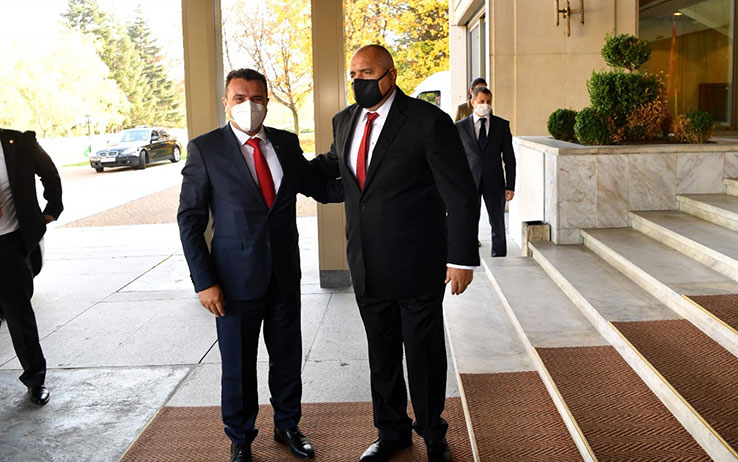Radosveta Vassileva
 Bitterness escalated after Bulgaria’s veto on Macedonia’s accession talks due to disputes over history. Yet, a closer look may reveal that the clash between Bulgaria and Macedonia was foreseeable.
Bitterness escalated after Bulgaria’s veto on Macedonia’s accession talks due to disputes over history. Yet, a closer look may reveal that the clash between Bulgaria and Macedonia was foreseeable.
When Bulgaria and Macedonia signed their Friendship Treaty in 2017, many politicians, diplomats, and analysts were pleased. EU High Representative Federica Mogherini and Commissioner for EU Enlargement Johannes Hahn defined the document as “an inspiration for the whole region”. In an ironic twist, it took only three years for this treaty to promote antagonism instead of good neighborly relations.
Bitterness escalated after Bulgaria’s veto on Macedonia’s accession talks due to disputes over history which, according to the Bulgarian side, evidenced violations of the treaty. The disappointment spread beyond the borders of the two countries — the same experts welcoming the Bulgaria-Macedonia initiative in 2017 are now upset and are even calling Bulgaria a bully.
Yet, a closer look may reveal that the clash between Bulgaria and Macedonia was foreseeable.
What are friendship treaties for?
Friendship treaties proliferated after WWII. Their scopes vary tremendously — just like their achievements and pitfalls. For instance, the Treaties of Friendship, Cooperation, and Mutual Assistance were instrumental in building bilateral relations between the USSR and other countries in the post-WWII era. Historian Douglas Selvage has concluded, however, that they undermined the sovereignty of other East European states and promoted “exploitative bilateral arrangements to the USSR’s benefit”. This is unsurprising considering the inequality of bargaining power in these scenarios. The impact of the friendship treaty between China and the USSR has also been questioned by historian Austin Jersild who argues this alliance failed because the Chinese were frustrated with Russia’s “imperialism”.
Nevertheless, there are success stories, too. In 1963, France and Germany signed the Traité de l’Elysée supposed to enhance cooperation in international affairs, defense, and education. The latter section of the treaty is the most interesting for the two countries had committed to encourage collaboration between research institutions and to offer “all possibilities” for young people to “strengthen the ties that unite them and to reinforce their mutual understanding”. During a youth conference in 2003 organized by the Franco-German Youth Office founded because of the Traité de l’Elysée, students asked the German and French governments for a common history textbook — the first one materialized in 2006, but, arguably, it has not gained much popularity because of collisions with curricula.
What is wrong with the Bulgaria-Macedonia friendship treaty, then?
Bulgaria and Macedonia do not have the same bargaining power in the current scenario for the obvious reason that Bulgaria is an EU member which can use its status to promote exploitative arrangements. As early as 2017, it was foreseeable that it would do so. Bulgaria has been governed by a coalition between Boyko Borissov’s GERB party and three nationalist parties that check the far-right boxes based on policies and rhetoric. Surely, they would play the patriotism “card” if only to maintain their popularity, especially because the leader of (Bulgarian) VMRO and current Vice PM Krassimir Karakachanov served in Bulgaria’s communist secret services as an agent fighting “ideological diversion” by reporting on the so-called “Macedonian question”.
More importantly, the friendship treaty is not written in the friendliest of ways, which lends itself to abuse when the bargaining power is unequal. Instead of promoting research collaboration and exchange, which seem to be at the root of success in the Traité de l’Elysée, as explained in literature, it purports to set up a commission which I have already compared to a Ministry of Truth. Article 8(2), which envisages the creation of a Joint Expert Commission for Historical and Education Issues promoting “objective, scientific interpretation of historical events, founded on authentic and evidence-based historical sources”, undertakes a rather unrealistic endeavor if we consider the German-French experience.
 Source: makfax.com.mk
Source: makfax.com.mk
It took France and Germany, which were archenemies, at least 43 years to be ready and fully committed to have a common history textbook. Meanwhile, it has been asserted that this was possible because of decades of work through which conflicting issues were resolved via dialogue — the new readings of events were progressively introduced in national curricula. Cooperation between these countries in the area of history interpretation had started in the 1930s not because of politicians, but thanks to teachers. Furthermore, scholars have argued that French-German success was possible because the two countries were willing to reach a “negotiated truth” rather than strive for full objectivity — they managed to separate facts from moral issues.
History is elusive
If one is realistic, full objectivity is impossible in history. To illustrate, I will provide trivial examples, which are neutral to both Bulgaria and Macedonia, from my own experience because I have had the chance to take history classes in different countries.
While I do not recall being lost in translation, I vividly remember being lost in context many times. In the US, I learned that they established the EU — a statement which Europeans are likely to contest although it is true that without the support of the US behind the curtain, a Union may not have existed. In France, however, I was told that the origin of the European idea should be sought in the times of Charlemagne and Napoléon because they unified Europe — I am sure that many non-French citizens would vehemently disagree if only because of the violent methods of conquest these leaders relied on. I was also told the EU was established by Germany, France, Italy and the petits pays (small countries). My professor did not even bother mentioning the actual names of the Benelux states. Surely, many would find this derogatory. Moreover, I was rather surprised to learn that France considered itself a victor in WWII — this claim fundamentally clashed with my Bulgarian indoctrination.
Because of these diverse, incompatible narratives, I was confused for a long time until I took a class with Prof. Henry Rousso, a leading historian specialized in WWII. His contributions to knowledge include coining the notion of négationnisme (denial in history, especially vis-à-vis the Holocaust) and criticizing the mythology developed by Charles de Gaulle regarding the French resistance against Fascism during WWII. Prof. Rousso’s class exercises and exams were rather unconventional, too. He wanted to teach us to think critically rather than spill out questionable narratives we had learned by heart. For instance, he would give us several different sources pertaining to the same event, such as a news article from the 1940s, an excerpt from a textbook from the 1980s, and the transcript of a political speech, and he would ask us to write a commentary.
The ultimate message I keep from his class is that history textbooks are approved propaganda even in advanced democracies like France, so if you want to find the “historical truth”, you need to engage with primary sources. In the Bulgaria-Macedonia case, they may include, but are certainly not limited to, travel accounts from the particular time in question, personal letters such as the correspondence between Todor Aleksandrov and Peyо Yavorov, or the original publications of the songs of the Miladinovi (Miladinovtsi) brothers. It is possible that your truth will be unique too because we all see the world through different eyes.
How is this relevant to the Bulgaria-Macedonia clash?
You do not need to open a Bulgarian or a Macedonian history textbook to make an educated guess about its contents. Textbooks usually promote similar messages — nation X had glorious leaders and triumphant conquerors, once upon a time country X had more territory, country X was wronged so many times by its archenemies/neighbors, etc. Meanwhile, textbooks are silent or overly diplomatic about not so glamorous moments when nation X wronged other people — after all, they deserved it because their ancestors had committed something awful 100 years prior to this. There is always an excuse! Textbooks in small countries are likely to focus on how the Great Powers took detrimental decisions, which resulted in historic injustice, and on freedom fighters who sacrificed their lives, so that we could be what we are today.
However, somebody’s glorious leader could be someone else’s human rights abuser, and somebody’s freedom fighter could be someone else’s criminal. That is why, the personalities of tsar Boris III and Tito, who are often mentioned in the Bulgaria-Macedonia controversy, could be seen in a different light depending on one’s background, including family history. Conflicting narratives are not surprising — they just prioritize different aspects or promote half-truths. That does not imply we should not reason about what happened in context and learn that every coin has two sides, instead of handling verdicts and attacking each other straight away.
What is further obvious in the Bulgarian-Macedonian conflict is that dual standards prevail. Bulgarian Foreign Minister Ekaterina Zaharieva keeps giving strange interviews arguing that she has a treaty in hand with which Macedonia does not comply. In her latest appearance before Die Welt, she made bold claims that celebrating Tito in Skopje was equivalent to celebrating Hitler in Berlin. Even if these exaggerated comparisons are taken at face value, key questions remain: 1) why do so many Bulgarians freely celebrate Bulgarian communist dictator Todor Zhivkov when his regime was extremely violent and the communist regime was declared criminal by a special law?; 2) why was communism included as a mandatory topic in Bulgarian history textbooks only two years ago, not without a series of scandals about interpreting the period?; 3) if Bulgaria has claims about harassment of minorities in former Yugoslavia, why are the abuses against minorities in Zhivkov’s Bulgaria not part of the Bulgarian history curriculum? Tomasz Kamusella’s Ethnic Cleansing During the Cold War: The Forgotten 1989 Expulsion of Turks from Communist Bulgaria can provide food for thought.
Can we be friends in this toxic political environment?
Research has established that children at an early age have some notion of historical events through their family and community, which is difficult to alter. In some countries, which have experienced recent conflict, such as Northern Ireland, students may have different curricula depending on their Christian denomination. Division can thrive even in the same state over historical matters. Dialogue and patience seem key if living in peace is the goal. But what have Bulgarian and Macedonian politicians aimed at?
The disputes between our countries do not go beyond what Europe has seen before. However, the manner in which the two countries have committed to resolving their differences and the pressure which Bulgaria puts on Macedonia seem morally and legally unjustifiable. Bulgaria should be reminded that, historically, friendship treaties, which failed, have been terminated — because of their nature, they are difficult to enforce in a court of law. For a piece of paper which is intended as proof of political will to promote an environment in which we can coexist despite our differences and wounds, this treaty has inflicted excessive damage because of the short-sightedness and incompetence of our politicians.
There are both bilateral and EU mechanisms, which can facilitate dialogue that depends on goodwill at the end of the day. Would it not be simpler to organize an annual Bulgaria-Macedonia historical conference or a round table, develop partnerships between history faculties, and encourage summer schools for high school and university students? Exchanges and research collaborations are an easier start — we can at least get to know our viewpoints better.
Please refer to the Terms before commenting and republishing the content.
Note: The views and opinions expressed in this article are those of the author and do not necessarily reflect the views of the Institute of Communication Studies or the donor.


